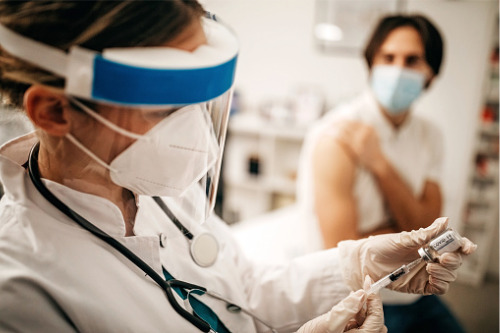

President Joe Biden has declared “help is on the way” to a nation devastated by the COVID-19 pandemic. On his second day in the Oval Office, the new President signed 10 orders aimed at kickstarting his national COVID-19 strategy. Under Biden, the federal government is taking full responsibility for the national pandemic response, using central expertise and funds to help states increase vaccinations and testing, and to gradually reopen schools and businesses.
Among Biden’s first orders was a directive to expand COVID-19 testing and vaccine availability nationwide, with a target of completing 100 million vaccination shots in his first 100 days in office. To achieve that goal, the Federal Emergency Management Agency (FEMA) has been tasked with establishing new vaccination centers, and the Centers for Disease Control and Prevention has been directed to build on a program devised by the Trump administration to make vaccines available through local pharmacies.
The goal of this vaccination strategy, according to Dr. Anthony Fauci, Chief Medical Advisor to the Biden administration, is to achieve widespread or “herd” immunity by the fall of 2021, which would require vaccinating as many as 280 million people.
One issue of great importance to the US business community, and something that every single company is grappling with at the moment, is the question of whether employers will have to, or will be able to, require their employees to get the COVID-19 vaccine before they’re allowed to return to work in an office. Joan Woodward, president of the Travelers Institute and EVP of Public Policy at Travelers, discussed this in the institute’s ‘Wednesday With Woodward’ webinar on “The Race to Distribute a COVID-19 Vaccine.”
“A lot of employers are very worried. We see it in our business of selling insurance to other businesses,” she said. Woodward was joined in the discussion by former FDA Commissioner Dr. Mark McClellan, who currently serves as the Robert J. Margolis Professor of Business, Medicine, and Policy, and founding director of the Duke-Margolis Center for Health Policy at Duke University. When she asked whether the health policy expert thought employers would have to mandate COVID-19 vaccinations in order to fully reopen the economy, McClellan said he thinks the US can reach “herd” immunity without mandating vaccines in the short term.
“To do the math for what it’s going to take, we’ve got close to 30 million Americans infected so far, and probably many more that haven’t had an official detection of their infection,” said McClennan. “I think most of the epidemiologic estimates now are maybe at 18-20% of the population that’s actually been exposed. Given this horrible surge we’re in the midst of now, that’s probably going to be 25% or more by the end of January.
“If we can get another 40-50% of people to take the vaccine throughout our country - not just in certain areas, but broadly - that’s a pathway to something like herd immunity, or certainly at least [a situation where] healthcare systems not being overburdened. You can see that happening by the end of the second quarter if things keep on track […] so we can get to a level of herd immunity if we do things right from here.”
McClellan, who is a former Administrator of the Center for Medicare and Medicaid Services, said he does expect mandatory vaccinations to happen at some point over the coming months, especially in high-risk workplaces. But right now, there are very few places that do it.
“At Duke University, we’ve made [the vaccination] available to all of our frontline health workers,” he added. “Some have said ‘no’, and that’s OK for now. We’ve got full precautions in place anyway - PPE, social distancing, etc. - and we have […] very good confidence that we’re containing spread within the workplace under these very modified conditions.
“If you want to go to back to a workplace that is less modified, you need to be very confident that you’ve got high levels of immunity in your worker population to relax some of those measures. That’s probably not going to happen in the next few months because we need to keep these measures in place anyway, and because we’re still early on with the vaccines.”
Both Pfizer and Moderna are “very much on track,” according to McClennan, toward completing their longer-term clinical studies and gaining full FDA approval (not just emergency approval) by the spring.
“By the second half the year, there should be several vaccines that are not just emergency approved, but fully approved, with very good safety, track records, regulatory data and so forth,” said McClennan. “I think after that point is when you’ll start seeing more requirements for getting vaccinations when people really want to move forward with reducing some of the distancing measures and getting more groups back together and things like that. But I think it’s much easier when you’re not dealing with emergency use, but you’re dealing with normal FDA-approved vaccines.”
